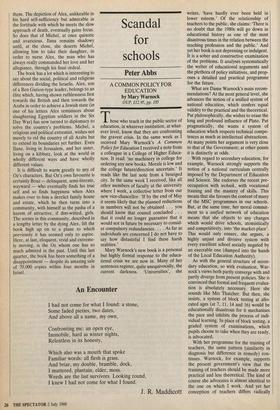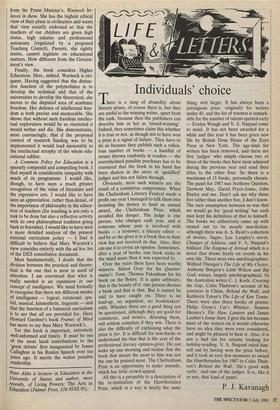Scandal for schools
Peter Abbs
A COMMON POLICY FOR EDUCATION by Mary Warnock OUP, .£12.95, pp. 185 Those who teach in the public sector of education, in whatever institution, at what- ever level, know that they are confronting the gravest crisis. In the same week as I received Mary Warnock's A Common Policy for Education I received a note from a colleague in a College of Higher Educa- tion. It read: 'no machinery in college for ordering any new books. Morale is low and the college future/direction uncertain.' It reads like the last note from a beseiged city. In the same week I received, like all other members of faculty at the university where I work, a collective letter from our new vice-chancellor: 'If by the end of May it seems likely that the planned reductions in numbers will not be obtained . . . you should know that council concluded . . . that it could no longer guarantee that it would not in future be necessary to consid- er compulsory redundancies. . . . As far as individuals are concerned I do not have to say how distasteful I find these harsh realities.'
Mary Warnock's new book is a personal but highly formal response to the educa- tional crisis we are now in. Many of her sentences register, quite unequivocally, the current darkness. 'Universities', she writes, 'have hardly ever been held in lower esteem.' Of the relationship of teachers to the public, she claims: 'There is no doubt that the 1980s will go down in educational history as one of the most disastrous times in the relation between the teaching profession and the public.' And yet her book is not depressing or indulgent. It is a sober and constructive examination of the problems. It analyses systematically the welter of educational arguments and the plethora of policy initiatives, and prop- oses- a detailed and practical programme for the future.
What are Dame Warnock's main recom- mendations? At the most general level, she advances the notion of a unified system of national education, which confers equal validity to the practical and the theoretical. Put philosophically, she wishes to erase the long and profound influence of Plato. Put pragmatically, she wants a system of education which respects technical compe- tences as much as intellectual abstractions. At many points her argument is very close to that of the Government; at other points it is distinctly at odds.
With regard to secondary education, for example, Warnock strongly supports the notion of a national curriculum centrally imposed by the Department of Education and Science. She endorses the recent pre- occupation with technik, with vocational training and the mastery of skills. This means that she favours the content of many of the MSC programmes in our schools. But, at the same time, her moral commit- ment to a unified network of education means that she objects to any changes which would drive schools, atomistically and competitively, into 'the market-place'. This would only ensure, she argues, a highly unjust and divisive system with every excellent school socially negated by an execrable one (dumped into the hands of the Local Education Authority). As with the general structure of secon- dary education, so with evaluation, War- nock's views both partly converge with and partly diverge from present policies. She is convinced that formal and frequent evalua- tion is absolutely necessary. Here she sounds like Mrs Thatcher. But then, she insists, a system of block testing at allo- cated ages (at 7, 11, 14 and 16) would be educationally disastrous for it mechanises the pace and inhibits the process of indi- vidual learning. In place of block testing, a graded system of examinations, which pupils choose to take when they are ready, is advocated.
With her programme for the training of teachers, the same pattern (similarity in diagnosis but difference in remedy) con- tinues. Warnock, for example, supports the present government's view that the training of teachers should be made more practical and less theoretical. The kind of course she advocates is almost identical to the one on which I work. And yet her conception of teachers differs radically from the Prime Minister's. Warnock be- lieves in them. She has the highest ethical view of their place in civilisation and wants that view socially endorsed so that the teachers of our children are given high status, high salaries and professional autonomy (regulated by a proposed Teaching Council). Parents, she rightly insists, cannot legislate on educational matters. How different from the Govern- ment's view.
Finally, the book considers Higher Education. Here, indeed, Warnock is elo- quent. Having suggested that the distinc- tive function of the polytechnics is to develop the technical and that of the universities to develop the theoretical, she moves to the disputed area of academic freedom. Her defence of intellectual free- dom is both precise and memorable. She shows that without such freedom intellec- tual exploration would be so restricted it would wither and die. She demonstrates, most convincingly, that if the proposed control of research funding was to be implemented it would lead inexorably to the intellectual atrophy of the whole edu- cational edifice.
A Common Policy for Education is a sparsely composed and compelling book. I find myself in considerable sympathy with much of its programme. I would like, though, to have seen a much greater recognition of the value of literature and the expressive arts. I would like to have seen an appreciation, rather than denial, of the importance of philosophy in the educa- tion of teachers (for teaching is not only a task to be done but also a reflective activity with its own philosophical tradition going back to Socrates). I would like to have seen a more detailed analysis of the present national curriculum policy — I find it difficult to believe that Mary Warnock's view coincides entirely with the ad hoc list of the DES consultative document.
Most fundamentally, I doubt that the division between the practical and theore- tical is the one that is most in need of attention. I am convinced that what is really needed is an expansion in our concept of intelligence. We need formally to recognise that there are different modes of intelligence — logical, relational, spa- tial, musical, kinaesthetic, linguistic — and that the function of a balanced curriculum is to see that all are provided for. Here Howard Gardner's book Frames of Mind has more to say than Mary Warnock's. Yet this book is important, extremely well-informed and timely. It must be one of the most lucid contributions to the 'great debate' first inaugurated by James Callaghan in his Ruskin Speech over ten years ago. It merits the widest possible readership.
Peter Abbs is lecturer in Education at the University of Sussex and author, most recently, of Living Powers: The Arts in Education (Falmer Press, 176.95/L8.95).















































 Previous page
Previous page